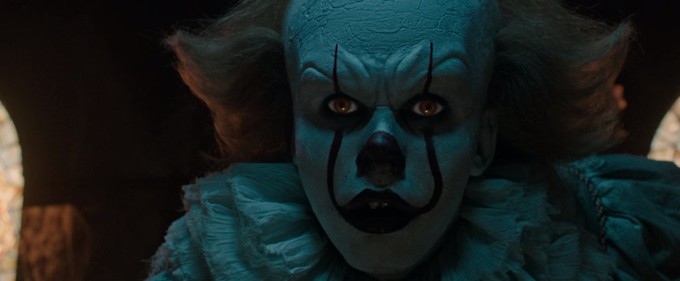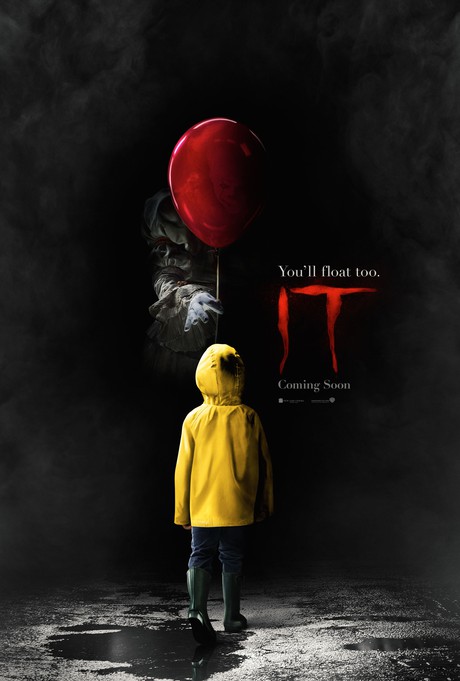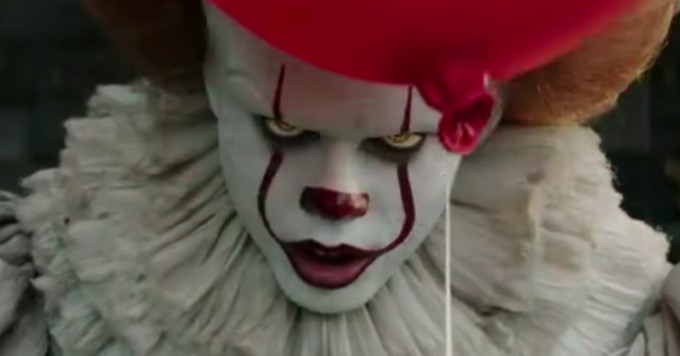Ahoy, squirts! Quint here. During my time on the set of the latest adaptation of Stephen King's IT I got to watch Bill Skarsgard work a little bit, but didn't get the chance to talk to him about building his character. The studio set up some phone time with me and a few of the other blogger types who were on the visit, though, and the transcript of that chat is below.
Skarsgard struck me as a guy who did his homework. He very much wanted to be prepared and seemed to take the right approach to getting into character as one of modern fiction's most interesting supernatural villains. There's many layers to this creature, as we discuss below.
Not wanting to take credit for anybody else's work, I distinguished my questions from the others. When it's something I ask, you'll see “Quint:”. When it's something someone else asked you'll see “Question:”. Got it? Good! Now let's get to talking about creepy clowns, Stephen King's original text and living up to Tim Curry's iconic performance.

Question: One of the most iconic things about Tim Curry's Pennywise was his voice. I was wondering if (for your interpretation) it's just going to be your voice by itself or if they're going to add anything in. What's it going to sound like?
Bill Skarsgard: No, it's just my voice. I play around with a lot of different versions of what this thing might sound like. The voice changed a lot from the first time I auditioned. I explore different versions of it and what would resonate the most with the audience. It was really when we did the full makeup test, where I would see what the character would actually look like. It's a very abstract way of preparing for something when you have no idea what he will look like. I didn't know what the makeup would look like, I didn't know what the prosthetics would be like.
We started exploring different things and I saw different prototypes of what he might look like and I started working with that. My first test with all the makeup and prosthetics is where I saw what the character would actually look like with me in it. That was something that I needed to kind of explore what this thing would sound like as well.
Quint: Pennywise is an interesting character because he's a bit fluid. He's a projection of a combination of different fears of the children he torments. How was that, as an actor, to base your performance off of something that can be anything that anybody is afraid of? I imagine that would be very freeing for you.
Bill Skarsgard: Yeah, absolutely. To me it was important to... I mean, I only have my own senses to go on, so I wanted to make something that I would be scared of. (laughs) So, an important thing for me in terms of preparing and creating the character was thinking “What are the things that I would really unsettling?” and explore that; your own kind of fears and what you find disturbing and amplify that in terms of performance. Essentially what you end up seeing in the film are my own deepest fears embodied in this character.
It's an extremely abstract character. The character is an entity taking the shape of a clown. I had to first figure out, for me, what the entity was, what the thing is that is taking the shape of the clown. The second step is to create the clown itself.
I thought it was fun. I didn't want the clown to be completely separate from the entity, right? I wanted It to really shine through Pennywise as opposed to Pennywise just being the clown. A lot of what the entity is I wanted to be in the background of who Pennywise is at all times. There's a line in the book that goes something along the lines of “Pennywise was It's favorite form.” It really enjoyed being the clown. It preferred to take the shape of the clown. Obviously that opened a lot of way of thinking to me. Why does It prefer being the clown? There's also this sense of enjoyment, so the entity that is It is enjoying being the clown. There's a lot of these very abstract ways to look at it and I really tried hard to take all that into consideration when I embodied the character. That was very exciting.
Question: A lot of times when someone takes on a role played by someone else they try to avoid watching the original performance. What was your relationship to Tim Curry's performance and how did that impact coming up with this new take?
Bill Skarsgard: I watched the mini-series going into this. Actually, I think I did it during the casting process, before I booked the job. I watched the whole thing and... it's cute. (laughs) It's very dated, you know? Tim Curry's performance is understandably iconic still, but the whole thing, to me at least, felt like something that is worthy of a remake or a re-adaptation. That's the way I see the film. It's not a remake of the TV mini-series, but a re-adaptation of Stephen King's book.
But watching it and seeing Pennywise as people know him... Because there's two different Pennywises. There's the Pennywise of the book, so people that read the book first will probably have their own vision of how Pennywise is and people who saw the mini-series first will probably think that is Pennywise. There is already two different versions. The one that's in the book is, obviously, left up to your imagination because whoever reads it will interpret it differently. In a sense there's an infinte amount of different Pennywises.
For me watching the mini-series, I really appreciated Tim Curry's take on it. It's iconic, it's great, but now I'll have to do something that's completely different. I don't see the point in making a film that's too similar to the one that's already been made, so I didn't try to think too much about that. I worked really hard to create my own interpretation of Stephen King's character.
Question: Just about every scene you have involves kids. So, how do you work with child actors when you're supposed to scaring them at all times?
Bill Skarsgard: The kids were great. They really lucked out with the cast they got. I'm not going to take any credit away from Andy (Muschietti) who directed it. He was really pursuing these kids. He's very good at casting, if I don't say so myself. (laughs) But all these kids were amazing little actors. We tried to keep them separate from me because we thought that might be a good idea. Working with kids you never know. So, we tried to keep me as myself separate from them, but also the character, so we would kind of have this tension between Pennywise and the kids.
The kids had already been shooting for a month before we started doing scenes with Pennywise. The first day of shooting, I'm working with Jack Grazer, who plays Eddie, and it's a very intense, physical scene where I'm an evil clown and I'm really going after him. Those scenes can sometimes be pretty intense. I think the scene itself was kind of intense for Jack. It's physical and kind of alive. After the first take I tried to make sure that he was okay and he was really excited. He was like, “Yeah, it was great, man! That was amazing! I love what you're doing with the character!” He was just really excited about it and I'm like, “Okay, I'm not dealing with just young kids here. These are little actors.”
That was really fun. It was fun working with them. I tried to bring out the best in them when we were working and Andy was amazing at encouraging the kids to explore. They would come up with ideas. They're very smart and very creative people.
The only difference in the cast, I think, was working with Georgie. His name is Jackson and he's 7 years old. That was different because he was way younger than the other kids. We had to work with him a little differently. Shooting that storm drain scene, he was noticeably affected by the sight of me being in the storm drain. But we're good friends in real life!

Question: Cary Fukunaga was originally attached to direct, but left. What was it like working with Andy Muschietti as your director? What was your collaborative process like?
Bill Skarsgard: I love working with Andy. I think he's amazing and he's become a very close friend to me through the process of working together. I was never involved with Cary's film. I never auditioned for it. I wasn't involved at all with that first attempt. I came in later when Andy was directing it and casting it.
There was a lot of amazing actors that read for it. Andy said so himself. I think there was a lot of amazing versions of Pennywise just in the casting process. You could have made 10 different versions of this film with 10 different actors that would do it just as good as I did, but Andy responded to something that I did, something I brought to the table. You go into (the casting sessions) with a character and it's such a full-on character. Even in the casting process you have to go in with a full character that you think is right. He responded to whatever I came up with.
So even going into the production (I felt) this was the guy who responded to what I thought the character would be like, so we had this kind of connection in that we both had similar ideas about what we wanted to do with the character. That started in the casting process, but it was very true throughout the whole production. I don't think we ever really argued about anything. We were always on the same page on what we were trying to do. That's not as common as you would hope in actor/director relationships. It was a lot of fun and I look forward to working with him many more times.
Quint: A lot of us saw you shooting the scene when you were crawling out of the screen for the slide projector scene. One thing I noticed watching you play the character was that he was a lot more animalistic than I was expecting. There were yippings and growlings and it really struck me that it must take a huge level of trust in your director to go that extreme. Was that trust crucial to your performance?
Bill Skarsgard: We did everything in so many different ways. Yeah, I don't think I could have done it if I didn't trust what Andy liked. He'd go “This is great, I'm really responding to this,” and I would just continue to do it, whatever that was. Ultimately it was essentially the most weird, disturbing thing we could come up with. It was important to me that there was something absurd about the character, something inexplicable. Why is he doing this? There this unpredictable absurdity to the character that will catch people off guard. There's a shock factor to never knowing what this guy is going to do next. You have no idea what he'll do or how he'll do it and there's no way of predicting his behavior.
Obviously that meant there was a lot of chaotic scenes and weird, explosive things that we did. I would do certain things and we'd find what he liked and explore it. If I didn't have that trust in Andy I don't think I'd ever be able to do it. You need to when you do something that out there.
Quint: Earlier you mentioned that you pulled something out of Stephen King's book that really helped you define the character. How much of the character that we'll see on the screen did you pull from the original text? Can you talk about anything you might have pulled specifically that informed the character?
Bill Skarsgard: I used the book, which I think is almost 1200 pages. In the script there is not much at all about who this character is. Not only is it just a 120 page script there's a point to not having too much Pennywise in it. You need to keep him mysterious. For me, I had to make Pennywise anything but mysterious. I need to understand him as much as I can.
I read the book and took a lot of notes on anything that describes Pennywise, or It, in any way. There's one chapter in particular where the entity It is the narrator and you hear its thoughts and what it thinks. There was this huge source material to go from. What is this thing? Why is he here? What does he think like? What does he like? What doesn't he like? I could use all of those things and come up with my own interpretation of what It is and then also what Pennywise is.
Using all of that and my own ideas and thoughts and conclusions to the character I can apply them to the more limited version, which is the script. At the end of the day that's what acting is all about. You almost create this infinite universe for the character you're playing and then you compromise it to the story that you're doing. Whatever character you play you explore endlessly more than what's on the page and you use that exploration to do the performance that is in the film. Hopefully people will see all that work and preparation in the little glimpses of (depth) in the film. You see what's there, but there's so much more happening with this character. I hope there's a lot of those little things that if people watch the film a couple of times they'll see it and understand my Pennywise more and more each time they watch it.

See, I told you he was committed. We won't know if we love or hate his Pennywise until next month, but I gotta give him credit for doing the research, understanding the character on a deep level and wanting to bring something new to it.
-Eric Vespe
”Quint”
quint@aintitcool.com
Follow Me On Twitter

